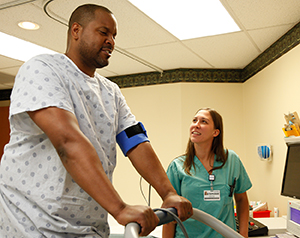Exercise Stress Test
An exercise stress test shows your heart's response to exercise. Your healthcare provider often gives you this test to evaluate the blood flow to your heart, your exercise tolerance, your heart's pumping pattern at different levels of work, or the presence of a heart rhythm disturbance. The test records your heartbeat while you walk on a treadmill or ride a stationary bike. The test can be done in a hospital, a test center, or your provider's office. It's also called a stress electrocardiogram (ECG). This test is only done if you're able to exercise. And if you don't have a health condition or symptoms that would make the test harmful for you.

Before your test
These tips can help you get ready for your test:
-
Tell your healthcare provider about any prescription and over-the-counter medicines you take. Include any vitamins, herbs, or other supplements. Ask if it’s OK to take them before the test.
-
Follow any directions you're given for not eating or drinking before the test.
-
Don’t smoke or have any caffeine for 3 hours before the test, or as directed by your provider.
-
Don't exercise right before the test.
Getting ready
These tips can help you get ready for your test:
-
Wear comfortable walking or running shoes.
-
Wear a shirt that you can take off easily. You may be asked to remove your clothing from the waist up. If so, you'll be given a gown to wear.
During your test
Here's what to expect during the test:
-
Staff will put small pads (electrodes) on your upper body and a blood pressure cuff on your arm. These are used to monitor your heartbeat and blood pressure during and after the test.
-
You're shown how to use the treadmill or bike.
-
You're then asked to exercise for several minutes. Expect the exercise to be easy at first. It will slowly get harder, with an increase in speed and incline every few minutes. This is done to monitor your heart as it's forced to work harder.
-
Exercise as long as you can, or until you're asked to stop.
-
You'll be asked to stop if you have certain symptoms. Another test to evaluate your heart may then be ordered.
Be sure to tell your healthcare provider if you feel any of these symptoms:
-
Chest, arm, or jaw pain or discomfort
-
Severe shortness of breath
-
Severe tiredness (fatigue)
-
Dizziness
-
Leg cramps or soreness
-
Faintness
-
Palpitations
After the test
Here's what to expect after your test:
-
You can go back to your normal activity, unless otherwise instructed.
-
The results are sent to your healthcare provider.
-
Keep your follow-up appointment to learn the test results and what they mean.
Online Medical Reviewer:
Marianne Fraser MSN RN
Online Medical Reviewer:
Rajadurai Samnishanth
Online Medical Reviewer:
Stacey Wojcik MBA BSN RN
Date Last Reviewed:
3/1/2024
© 2000-2024 The StayWell Company, LLC. All rights reserved. This information is not intended as a substitute for professional medical care. Always follow your healthcare professional's instructions.